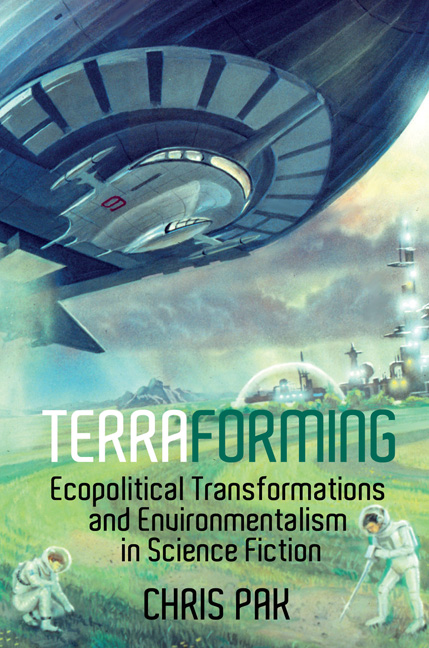Book contents
- Frontmatter
- Dedication
- Contents
- Acknowledgements
- Introduction: Terraforming: Engineering Imaginary Environments
- 1 Landscaping Nature's Otherness in Pre-1960s Terraforming and Proto-Gaian Stories
- 2 The American Pastoral and the Conquest of Space
- 3 Ecology and Environmental Awareness in 1960s–1970s Terraforming Stories
- 4 Edging Towards an Eco-cosmopolitan Vision
- 5 Kim Stanley Robinson's Mars Trilogy
- Conclusion
- Works Cited
- Index
2 - The American Pastoral and the Conquest of Space
- Frontmatter
- Dedication
- Contents
- Acknowledgements
- Introduction: Terraforming: Engineering Imaginary Environments
- 1 Landscaping Nature's Otherness in Pre-1960s Terraforming and Proto-Gaian Stories
- 2 The American Pastoral and the Conquest of Space
- 3 Ecology and Environmental Awareness in 1960s–1970s Terraforming Stories
- 4 Edging Towards an Eco-cosmopolitan Vision
- 5 Kim Stanley Robinson's Mars Trilogy
- Conclusion
- Works Cited
- Index
Summary
The first book-length narratives that dealt with terraforming as part of their foreground or as their organising motif were published in the 1950s: Ray Bradbury's The Martian Chronicles (1958 [1950]) collected his 1940s short stories into a single volume that portrayed the colonisation and terraformation of Mars; Robert Heinlein's Farmer in the Sky (1967 [1950]), set on Earth and Ganymede, was the first novel to dedicate its narrative to terraforming; and Arthur C. Clarke's The Sands of Mars (1976 [1951]) looks with irony at the pastoral romanticism that informs the language of stories of colonisation. These texts are offset by another collection of texts that offered a polar response to the utopianism depicted in these early 1950s stories. They used the motif of planetary adaptation to explore the inequalities and excesses of humankind's social and political relations. Such dystopian narratives include Frederik Pohl and C.M. Kornbluth's The Space Merchants (1974 [1953], first serialised in 1952 as ‘Gravy Planet’), Walter M. M iller's ‘Crucifixus Etiam’ (1973 [1953], first published as ‘The Sower Does Not Reap’), and Poul Anderson's ‘The Big Rain’ (2001 [1954]) and The Snows of Ganymede (1958 [1955]).
In the late 1950s to early 1960s the narratives of the first terraforming boom began to shift ever-more emphatically towards the terraformation of planets inhabited by alien species. The shifting foci of these stories index a corresponding shift of concern in the sf of this period and a transformation of how terraforming was used to comment on society. The worlds imagined in these works helped shape a tradition of consensus about the possible futures that might develop from the trends of the 1950s. Central to this image of time is its construction through a dialogue between texts, one whose nature became increasingly sophisticated as it was deployed and re-deployed to explore social, technological, political and philosophical concerns.
These terraforming stories often deployed pastoral motifs and structures to engage in socio-political enquiry. In his essay on novelistic chronotopes, Bakhtin classifies the pastoral as a subset of the idyll, which he isolates in four ‘pure types: the love idyll (whose basic form is the pastoral)…
- Type
- Chapter
- Information
- Publisher: Liverpool University PressPrint publication year: 2016



